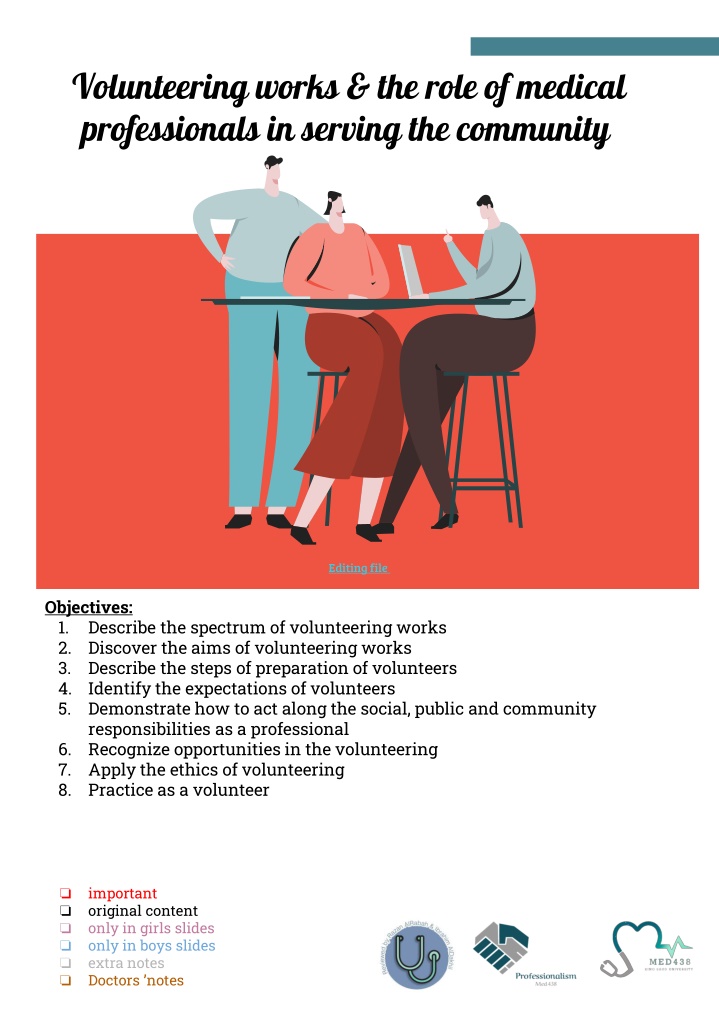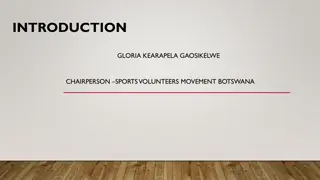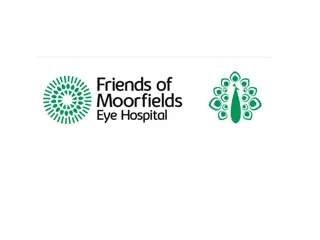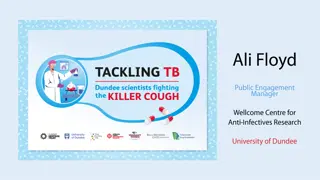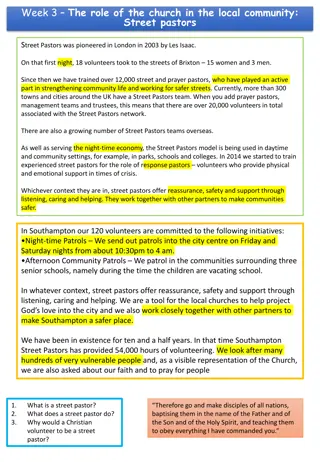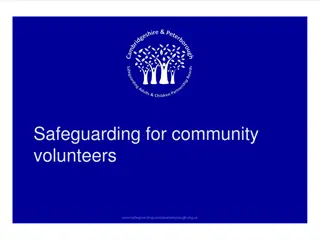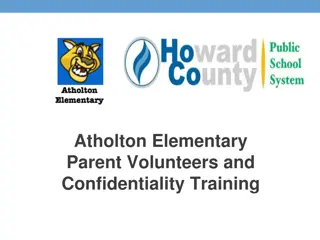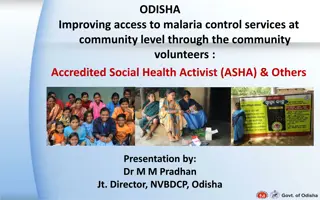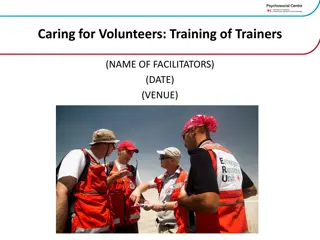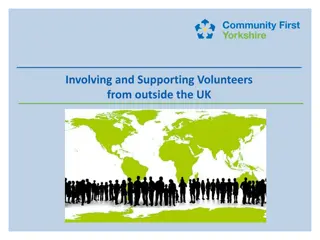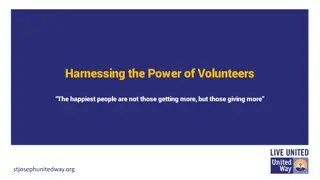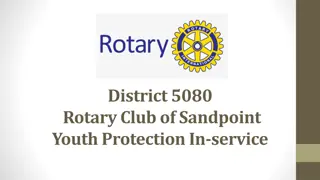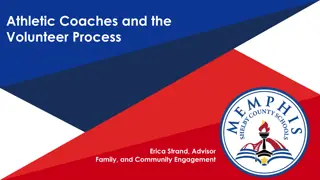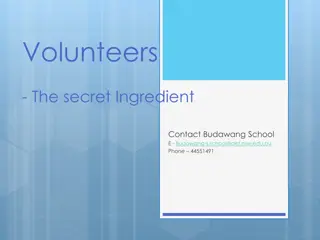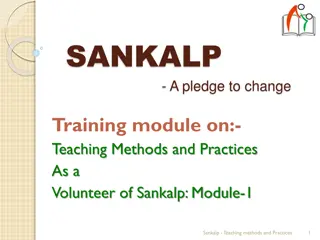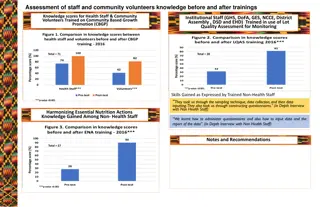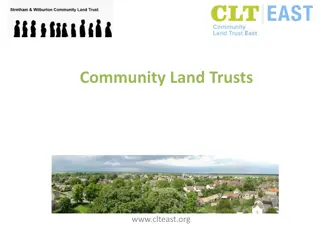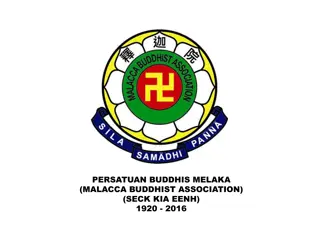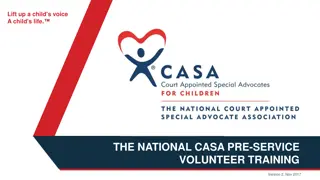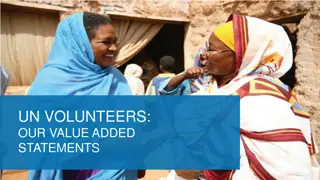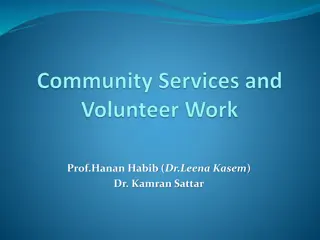Role of Volunteers in Community Service
Spectrum of volunteering works, its aims, preparation steps, and expectations. Highlighting the social and community responsibilities of medical professionals in serving the community.
Download Presentation

Please find below an Image/Link to download the presentation.
The content on the website is provided AS IS for your information and personal use only. It may not be sold, licensed, or shared on other websites without obtaining consent from the author.If you encounter any issues during the download, it is possible that the publisher has removed the file from their server.
You are allowed to download the files provided on this website for personal or commercial use, subject to the condition that they are used lawfully. All files are the property of their respective owners.
The content on the website is provided AS IS for your information and personal use only. It may not be sold, licensed, or shared on other websites without obtaining consent from the author.
E N D
Presentation Transcript
Volunteering works & the role of medical professionals in serving the community Editing file Objectives: 1. Describe the spectrum of volunteering works 2. Discover the aims of volunteering works 3. Describe the steps of preparation of volunteers 4. Identify the expectations of volunteers 5. Demonstrate how to act along the social, public and community responsibilities as a professional 6. Recognize opportunities in the volunteering 7. Apply the ethics of volunteering 8. Practice as a volunteer important original content only in girls slides only in boys slides extra notes Doctors notes
VOLUNTEERING Volunteering is promoted as a way of enhancing students career prospects, ytinummoc ni devlovni gnitteg sa emit emas eht ta seitivitca . Students are increasingly exalted to build up their CV eht ni selfiorp ytilibayolpme gnicnahne fo tiusrup . Volunteering work 1. What is volunteering? 2. Who is the volunteer? 3. Why do you want to be a volunteer (benefits)? 4. What difficulties stop you becoming a volunteer? 5. How to be a volunteer? 6. How to start an awareness campaign? 7. Report writing and presentation of volunteering work? What is volunteering? any activity which involves spending time, unpaid, doing something which aims to benefit someone (individuals or groups) other than or in addition to close relatives, or to benefit the environment . Volunteering as an education activity Formal Non-Formal Informal
Volunteering as an education activity 1 Non-formal Education dezinagro yna si )EFN( educational activity ecalp sekat taht outside lanoitacude lamrof si ti yllausU .metsys sesu dna dezilautxetnoc ,deretnec tegrat cfiiceps on si erehT .hcaorppa yrotapicitrap a stluda ro htuoy ,sdik eb dluoc ti ;EFN rof puorg . eht - renrael ,elbixefl 2 Informal Education sa denfied eb nac , a process throughout life nosrep yreve hcihw yb , acquires dna accumulates knowledge, abilities, attitudes through everyday experiences ,at work or during leisure activities In some universities & colleges, volunteer activities are part of the curriculum . netfo era seitivitca esehTorganized like other curricular programs stneduts ; sruoh fo rebmun tes a nevig era work to complete, followed by assessments. Volunteering can be a part of non-formal and informal learning. Volunteer motivation A. Expectancy Motivation Theory B. Altruistic Motivation this theory suggests that behavior is caused by a belief that it will result in a desired reward or goal. altruism is an aspect of human motivation that is present to the degree that the individual derives intrinsic rof sdrawer cihcysp ro noitcafsitas ot gnitpmettaoptimize the intrinsic satisfaction of one or more other persons without the conscious expectation of participating in an exchange relationship. Three factors affect behavior : 1. The need for achievement si hcihw , edirp gnikat rof yticapac eht sa denfiedin accomplishment. 2. The need for affiliation eht sa denfied , eno rof nrecnoc s relationships with others . 3. The need for power na evah ot gnitnaw ro , srehto no tcapmi ro ecneuflni .
Factors favor volunteering Internal External 1. 2. 3. 4. Personal satisfaction 5. Social status 6. Family traditions 7. Identification with organization/college 8. Personal obligation 1. 2. 3. 4. Organizational/college reputation 5. Holidays 6. Natural disasters 7. Being invited 8. C.Vs differentiation 9. Identification with other volunteers (friend/family) Self esteem Generosity Social responsibility Professional image Recognition from society Organizational/college image Principles of Volunteering 1 2 Independently chosen &freely given Mutually beneficial 3 To individual & organisation Enabling 4 Has a community or social benefit elbixefl & 5 wherever possible Offered to not-for- profit activities Ethics of volunteering Trustworthiness Respect Justice ssenriaf & Compassion &generosity Responsibility
Who is the volunteer? 1. Someone who does work without being paid for it because they want to do it Someone who offers to do a particular task or job without being forced to do it 1. Why do you want to be a volunteer )stfieneb( ? 1 Volunteers live longer & healthier During later life, volunteering is even more beneficial for one s health than exercising and eating well . Volunteering establishes strong relationships study reported that prevalence of loneliness is at an all time high, with about one in three adults age 45 or older categorized as lonely . Dedicating your time as a volunteer helps you make new friends, expand your network, and boost your social skills Volunteering is good for your career Volunteering has long been viewed as a way to create new weak tie connections that lead to career opportunities 2 3 4 Volunteering is good for society 5 Volunteering gives you a sense of purpose Although it is not well-understood why volunteering provides such a profound health benefit, a key factor is assumed to be that volunteering serves to express and facilitate opportunities to carry out one s sense of purpose Volunteering helps counteract the effects of stress, anger, and anxiety Volunteering combats depression. Volunteering increases self-confidence Volunteering helps you stay physically healthy
What difficulties/obstacles stop you becoming a volunteer? People Can t People don t want to 1. Lack of benefits 2. Non-accountable 3. social boundaries 4. Stress from volunteering Nobody asked 1. 2. Lack of time Physical boundaries Lack of skills Lack of opportunities 3. 1. Preconceptions / egelloc nihtiw sedutitta & 1. 2. Lack of child care 3. Overcommitted leaders or citizens 4. Too many involved 5. Poor organization of existing action groups 6. History of unproductive meetings Lack of transportation noitazinagro eht 2. Inadequate community communication 3. Limited experience 4. History of being ignored 5. Resistant leaders 6. Sense of powerlessness 7. Lack of time
How to be a volunteer? Tips for getting started First, ask yourself if there is something specific you want to do . For example do I want: ...to make it better around where I live ...to meet people who are different from me ...to try something new ...to do something with my spare time ...to see a different way of life and new places ...to have a go at the type of work I might want to do as a full-time job ...to do more with my interests and hobbies ...to do something I m good at The best way to volunteer is to match your personality and interests Having answers to these questions will help you narrow down your search How to find the right volunteer opportunity? Ask yourself the following: Would you like to work with adults, children, or remotely from home? Do you prefer to work alone or as part of a team? Are you better behind the scenes or do you prefer to take a more visible role? How much time are you willing to commit? What skills can you bring to a volunteer job? What causes are important to you?
IMPORTANT! Awareness Campaign How to start an awareness campaign? The Precede-Proceed Model The model involves nine phases is based on the premise that a thorough assessment )Precede noitomorp htlaeh a ( noitaulave dna ,noitnevretniProceed snoitnevretni fo ssenevitceffe eht fo . gninnalp erofeb ot ssecorp eht ot ni tliub si ) elbane tnemerusaem edam eb dluohs ) Priority targets eht fo esahp hcae hguorht dehsilbatse era noitnevretni rof ( ssecorp tnemssessaphases fo niahc eht ni ecnatropmi lasuac fo sisab eht no ) ytilibaegnahc rieht dna ecnelaverp rieht ,stnanimreted htlaeh . 5 1 The results of this assessment process guide the development noitnevretni eht fo (phase 6 ) The evaluation (phases ssecorp tnemssessa eht ni stegrat tnatropmi sa defiitnedi . srotcaf no noitnevretni eht fo tcapmi eht skcart neht ) 9 7 Application of the Precede-Proceed Model to the Company Strategy
Active Participation Education & Awareness Leadership Spectrum of volunteer engagement Report writing and presentation of volunteering work 1. Awareness campaign topic 1. Why did you choose this topic? (importance) 1. How did you plan for the community awareness campaign ? ( phases 5 ) 1 - 1. How did you do in the day of the community awareness campaign day? (phase 6 ) 1. What did you learn during this activity? (phases 7,8,9 ) 1. What difficulties did you have during this activity? (phases 7,8,9 ) 1. How will you improve same/another community awareness campaign activity? 1. Attach photos and working schedules of the community awareness campaign (details name and task of each participant).
A SHOUTOUT TO ALL TEAMWORKS This is a THANK YOU letter for each Team Leader & Member Thank you for volunteering & giving some of your time & effort to make life easier for us The fact that you are doing this out of your free well shows how a great person you are): We will always be in your debt Please keep up your GREAT work All love & appreciation - Professionalism Team Family & Community Medicine Superheroes behind it all Hematology 438teamwork
Team leaders Abdulrahman Bedaiwi Zahrani Amirah Al- Team members Abdullah Alassaf Abdullah Alasmari Abdulrahman Almezaini Khalid Alkwai Mohammed Alhamad Deema Almaziad Elaf Almusahel Rema Almutawa Renad Almutawa Shahd Alsalamah Taif Alotaibi Tarfah Alkaltham Say cheese ): THANK YOU! Give us your feedback!
